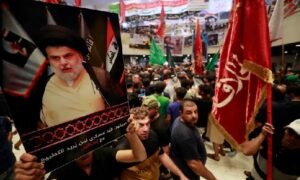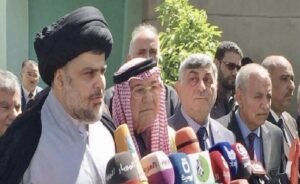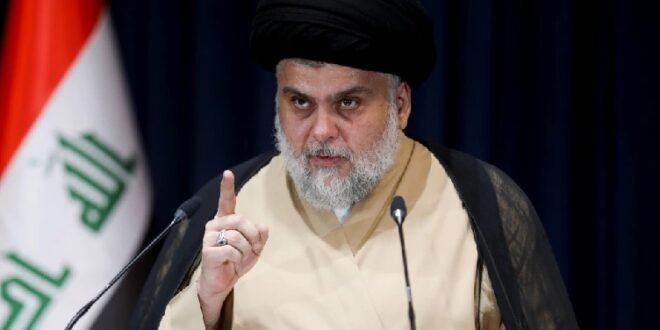21-10-2025
BAGHDAD: In a statement last month, Iraqi Shia leader Muqtada al-Sadr said his movement would boycott the November elections, hinting he wants to “change the faces and save Iraq”, reportedly his endgame since he withdrew his bloc from parliament in June 2022.
 He also took aim at political rivals, the Shia Coordination Framework (SCF), a coalition of Iran-backed parties that became the largest Shia bloc in parliament after he withdrew, accusing them of rocket attacks against his allies.
He also took aim at political rivals, the Shia Coordination Framework (SCF), a coalition of Iran-backed parties that became the largest Shia bloc in parliament after he withdrew, accusing them of rocket attacks against his allies.
Al-Sadr’s statement spoke of demanding no less than total system reform, but did not mention that the Sadrists had in fact held private back-channel negotiations with the establishment to try to re-enter the electoral race, which ultimately failed.
Attempting a return
Al-Sadr’s withdrawal cannot be seen as a total boycott of politics; it is rather a postponement of his ultimate goal of forming a government on his terms.
He seems to be playing a long game, waiting for the state to collapse under his rivals’ governance while positioning the Sadrists as the most organized, unaffiliated power ready to step in.
According to a source close to al-Sadr, speaking on condition of anonymity, the leader had agreed to pressure from key Sadrists who wanted to participate in the election, arguing it would protect remaining Sadrist officials facing pressure in state institutions.
Despite initial reluctance, al-Sadr eventually agreed: The Sadrists would temporarily suspend their three-year boycott, with the understanding that al-Sadr could withdraw again if he chose.
But they would need an extension to the official registration period, which had elapsed, and the source said al-Sadr approved opening channels with Prime Minister Mohammed Shia al-Sudani, who was appointed by the SCF, the biggest parliamentary bloc, to ask for an extension.
 The SCF refused, reluctant to see the Sadrists return and compete with its members, especially smaller groups running on their own this year but Sadrist politicians kept negotiating for a deadline extension until Al-Sadr undercut his negotiators in July, posting a handwritten note with the hashtag #Boycotters, ending the talks.
The SCF refused, reluctant to see the Sadrists return and compete with its members, especially smaller groups running on their own this year but Sadrist politicians kept negotiating for a deadline extension until Al-Sadr undercut his negotiators in July, posting a handwritten note with the hashtag #Boycotters, ending the talks.
2022, a ‘national majority’ foiled
Al-Sadr boycotted the political process in 2022 after his plan to form a “national majority” government failed in the face of Iraq’s power-sharing agreement, Muhasasa, in place since 2006.
Muhasasa distributes cabinet positions and state resources along ethno-sectarian lines, with all parties in parliament forming the government and receiving executive posts equal to their representation.
Proponents say Muhasasa prevents the return of a dictatorship like Saddam Hussein’s, while critics say it diffuses accountability and is a primary cause of government failure.
In contrast, a “national majority” government is formed by blocs that secure a parliamentary majority of more than 50 percent, forcing other blocs into the opposition with no executive positions.
Sadrists were laying the groundwork for a parliamentary alliance months before the October 2021 election.
The outreach began in April with a first-ever phone call between Al-Sadr and a major Sunni leader, Mohammed al-Halbousi. In June, a high-level Sadrist delegation made an unprecedented visit to Erbil to meet with Barzani’s Kurdish Democratic Party (KDP) for similar talks. (Int’l News Desk)
 Pressmediaofindia
Pressmediaofindia




